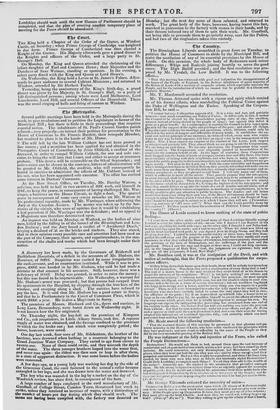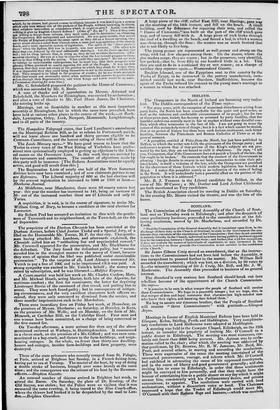ebe Country. The Birmingham Liberals assembled in great force on
Tuesday, to petition the House of Commons to abide by the Municipal Bill, and resist the mutilation of any of its essential provisions by the House of Lords. On this occasion, the whole body of Reformers sunk minor differences' Whigs and Radicals joining heartily to serve the good cause. The High Bailiff presided ; and the first resolution was pro- posed by Mr. Tyndall, the Low Bailiff. It was to the following effect- " That this meeting has witnessed with grief and indignation the disappointment of the hopes of the People of England, in the factious interference of great majority of the House of Lords with a measure of corporate reform, which especially interests the People, and for t he introduction of which we cannot but be grateful to a liberal and patriotic Minister."
Mr. T. Macdonnell seconded the resolution.
Mr. Thomas Attwood spoke with a vigour and spirit which remind us of his former efforts, when marshalling the Political Union against the Duke of Wellington and the Tories. Speaking of the Corpora. tion Bill, be said -
•• I cannot but say. I altegether approve of it. It is a wise, and just, and patriotic measure—very much resembling our Political Union. It differs only in this, it makes the Council to be elected by the householders paying rates of any, the smallest.. amount. instead of being elected by the people at large ; but against this defect it gives us a great benefit. As a counterpoise, it enables the Council to levy taxes upon .jjle rich for the support of the rights and privileges of the poor ; and above all things, It legalizes and confirms the meetings and operations. which, hitherto, could only be effected in the midst of dangers and difficulties of many kinds. It establishes the an- cient scot and lot principle of our ancestors, in virtue of which, every man who contris butes in any way to local expenses, will have an equal voice in the management of his straits. Now, I must express my surprise at the conduct of the Lords, with respect to this just and patriotic bill. They almost think we are going to rob the Corporations. We are doing no such thing. We are only preventing the Corporations from conti- nuing to rob us. The Corporations were originally granted to householders of bo- roughs for the common benefit of all. In the lapse of centuries, these Corporations have dropped into the hands of knots of usurpers, twenty here and fitly there, who have no community of feeling with their neighbours, and who have, in many cases, appro- priated the public property to their own immediate use and advantage. A II t his we are go- ing to rectify. But what do the Lords say ? With the same imbecility and doggedness which distinguished them in thebill of ltefiorm.they gravely tell us they will make our re- medy worse than our disease. lt ith this bill,they seriously adopt various strange and tit- bit rary amendments, as they arc pleased to call them I will only name one of them. which is sufficient to mark all the others. They gravely propose that the rate-payers in every borough shall be divided into six classes, each man to be estimated according to the rates which lie pays. They then propose that the Councillors—to wit, ninety for this town—shall be chosen from No. 6, being the highest of all the rate-payers; and thus they would deliver us up into the hands of a set of dandies and old ladies, and of men so immersed in their various occupations as merchants or manufacturers. as to be totally unable to give any attention to public business. The dandies and old ladies would thus have every thing their own way, if the House of Commons should be base enough to adopt this clause, which I trust they will not be; and if the People of Eng- land should be base enough to submit to it. which I know they will not. (Tremendous che, risg, and cries If •• We never trill.") What then can the Lords possibly mean by this conduct ? Do they mean to force the restoration of Political Unions throughout the country ?" (Cheers.) The House of Lords seemed to know nothing of the state of public feeling- '. I went there the other night, and found many of their Lordships literally raging. I called to mind the fallen tyrants of old,—on one side I fancied I saw Bajazet in his iron cage, gnashing his teeth with rage; on the other side. I thought I saw Nebuchad- nezzar crawling upon the earth ; and I said to myself, • When his mind was lifted up and his heart hardened with pride, he u-as deposed from his kingly throne, and they took his glory from him.' I called to mind the sordid cruelty of these men; how they disre- garded the sufferings and the prayers of the people; and how their sordid and cruel nominees, in what they called the Iluuse of Commons, had contemptuously disregarded the petitions of the men of Birmingham, aunt the sufferings of the poor and the oppressed. When I saw the rage aud despair of these men, I could not help exclaim- ing, in the language of holy Writ, • God. thy judgments are righteous; holy and just are all thy judgments, 0 Lord, Most High "
Mr. Boultbee said, it was at the instigation of the Devil, and with malice aforethought, that the Peers proposed a qualification for corpo- ration officers.
" If they bring down their house upon their heads, there will be nobody to reproach or blame but themselves. Was there ever such a combination of every thing that is bad ? The rent of a man's house is the only standard they could think of as his fitness to guard the interests of his neighbours. What ! is integrity nothing? are talents and understanding nothing ? is industry nothing? Upon this principle, the most upright honourable, intelligent, and indefatigable man, has not the smallest claim to your con- fidence, unless he live in a house of ceitain dimensions ; but any worthless vagabond who happens'', occupy such a house, must be every thing you can require in a public servant. Then, as if it were determined to render the fully equal to the iniquity, these hereditary wise men have entirely failed to secure the only object they had iu view, the affluence of the party ; fur, if an improvident spendthrift take a house twice as large us he can afford to pay for, he ipialilies himself to guard the affairs of others by the very means which prove that he is totally incompetent to manage his own. No language can express the indignation this prove sling has occasioned from one end of the country to the other. Sir Robert Peel has told yon nothing can resist the pressure from without. Let that be your watchword : unite ail your efforts, and give the Peers such a squeeze as shall make them ache from head to foul, and caws° their stars for having adopted this infernal net of combined injustice, lolly, and audacity, which can have proceeded from nothing but infatuation.
Mr. Beale moved the following resolution- " That the warmest thanks of this meeting be presented to that glorious and pa- triotic minority in the !louse of Lords, who have nobly vindicated the principles which they have professed; and now stand as inflexibly by the cause of the People is they i
did in the ever-memorable passing of the Reform Bill.
He was indignant at the folly and injustice of the Peers, who called the People Destructives-
Destructive, ! Ile would ask them to look around them upon the vast increase of comfortable and elegant habitations which, within a few years, had been raised by their industry. He could remember, not only Birmingham, but Manchester. and other places, when they were not half the size they now are; and by whose energi-s had they prospered and increased? Had not this wealth been produced, and these ['ghillies been erected, by those very men who were so falsely and insolently styled Destructives ? Could their Lordships accomplish such things ? Could they thus add to the wealth of the nation ? Assuredly not. Ile rejoiced in the unanimity that prevailed amongst them. Ile felt strong indignation against those who so unjustly opposed the measures of public good ; but he would nut withhold his admiration from those noble lords who had distinguidn d themselves by their attachni,mt to the +•-muse of the People; and he thercl'ore Iwd great pleasure in proposing the resolution which he had just read to them.
(Idrid chrer$,)
Mr. George Edmonds enforced the necessity of union-
Coraore Reform was the great point upon which all classes of Reformers ought
now to be united, and to carry which their concentrated force and energies were neces- sary. If the People gave up Corporation Reform, they must give ep all oeli»r reforms; they must give up the Irish Church. And were they, he would ark, willing to give up that? (Cries of '• No,su I") Were they willing to give up the reform of that Church. which, by Its abases, bed proved a curse to religion, because it was based upon a system wtficb only took Money out of the pockets of the People, a Mout rendering. In return, that renews tastruction or consolation which it ought to give? Again, were they willing to give up English Church Reform? (,eels! of" No. so I") :1 hen if they.urre *tot willing to forego these reforms. they must mute. and be determined oat (dimming the Corporation Bill unimpaired and unmmilated. lie was quite certain, that unless the People of England evinced the same spirit as they did on a former Inwasrou, I hey waver would obtain a relief from Church-rates, a more just appropriation ui the chard), funds. and ir more equitable system of legislation. The spirit of the ..,three glorio :s days," when the Reform Hill was in jeopardy, was now necessary. (The aileer,n to these days was plowed by the Ma estherdastic cheering.) Let the l'eers nettilate the bill ; but let them beware that, iu doing so. they do nut mutilate themselves. (T, e. menden cheering.) He was at a loss to conceive tv hat the Louis could propose to I Item- sehes in thus trifling with the nation. What could they anticipate? lie !lid not xis!' to indulge in unfavourable anticipations, but he must say, that their prospects mere Bloomy. if they persisted in madly opposing the will of the People. It was his firm opinion, that they were not aware of the position in which they stood, for if they 'sere, it was impossible that they could bring themselves to act in the manner in rr Inch they had. They seemed to be blind to the progress of events; for he was much mistaken if the time would not eventually arrive, when nations would contrive to govern them- selves through their Representatives, and when Kings and Lords would he no more. (Tremendous cheering fur some time.)
Mr. C. Scholefield proposed the petition to the House of Commons ; which was seconded by Mr. S. Beak.
A vote of thanks and of approbation to Messrs. A ttwood and Echolefield, the Members for Birmingham, was carried by acelamation ; and after a vote of thanks to Mr. Paul Moon James, the Chairman, the meeting broke up.
Meetings, not so formidable in number as this most important assembly at Birmingham, but in which the same tone prevailed, have been held at various other places in the course of the week,—at Roch- dale, Lymington, Otley, Leek, Newport, Aionmouth, Loughboruugb, and in all parts of the country.



























 Previous page
Previous page